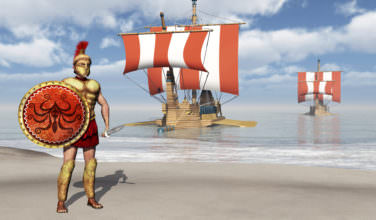Get to Know Antiochus III The Great
Comments Off on Get to Know Antiochus III The Great
 Antiochus III, referred to in historical terms as Antiochus The Great or Antiochus III The Great is widely considered amongst the most accomplished kings in ancient Greece’s history. He was especially known for his prowess as a military commander and propensity for increasing the kingdom’s territory, and this is how he really made a name for himself. Here’s more information about who he was and what he accomplished:
Antiochus III, referred to in historical terms as Antiochus The Great or Antiochus III The Great is widely considered amongst the most accomplished kings in ancient Greece’s history. He was especially known for his prowess as a military commander and propensity for increasing the kingdom’s territory, and this is how he really made a name for himself. Here’s more information about who he was and what he accomplished:
Early Life of Antiochus III
Antiochus was born in 241 BC in Susa, Persia to nobility. His father was King Seleucus II, a member of the noted Seleucid Dynasty. Antiochus ascended to the had of the family’s throne upon the murder of his brother Seleucus III.
The young king inherited a chaotic state comprised of fractured communities and displaced persons that ultimately lead to revolt. In an attempt to solidify his name and reputation, in addition to creating some semblance of unity and continuity amongst his subjects, he led an attack on Ptolemaic Syria. Unfortunately, this turned into a major military blunder.
Subsequent battles were also not much with much success. The first notable victory of his armies occurred in 216 BC when said forces were able to penetrate into Anatolia and eventually conquer this territory with authority in 213 BC. Now firmly in control of this vital part of Asia Minor, Antiochus III then set his sights on Parthia, which his forces invaded and took control of in 209 BC.
How He Became “Great”
The later part of 209 BC saw Antiochus III win a major reputation-building battle. Upon invading Bactria, he and his armies faced off with Fellow Greek ruler Euthydemus I, which the former’s forces won handily. From 205 through 204 BC, the confident king led several expeditions along the Persian Gulf until ultimately reaching the Arabian coast. In the eyes of historians and his fellow combatants, these victories earned him the “great” title.
Arguably, the height of his success came in 198 BC when the forces under his command took out those led by the famed Scopas in the Battle of Panium. This victory was historic in that Scopas’s defeat ended Ptolemaic rule in Judea.
Battle With The Romans And His Downfall
After defeating Scopas, Antiochus III solidified the Seleucid Empire’s stranglehold on Asia Minor by conquering any lingering Ptolemaic states. These actions roused the ire of the Roman Empire. Tensions were only heightened when the empowered Antiochus III invaded Greece and became the self-proclaimed “defender of Greek freedom.”
Antiochus’s armies finally faced off with Roman forces in 191 BC when the two sides clashed at the Battle of Thermopylae. Unfortunately for Antiochus III, the powerful Roman forces under the tutelage of Manius Acillus Glabrio overpowered the their Greek counterparts. This defeat was the beginning of several major setbacks for Antiochus III, who lost his empire by 188 BC and died one year later.
Despite his early struggles and ultimate defeat, Antiochus III is still revered as a substantial figure in ancient Greek history. The monarch has received historical accolades for his bravery and leadership capabilities. Additionally, the ruler was immortalized on an ancient Greek coin with an inscription labeling his as “Antiochus The Great.”
Source:
Wikipedia – Antiochus III the Great
Categorized in: Ancient Greek History
This post was written by Greek Boston





